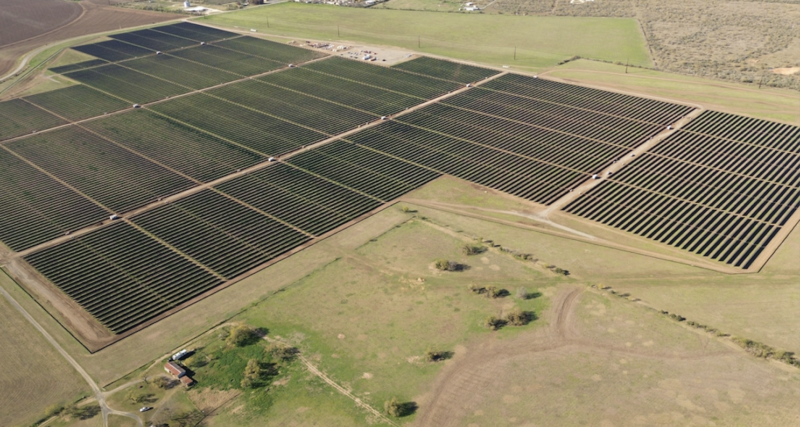
Sign up for daily news updates from CleanTechnica on email. Or follow us on Google News!
Last year was another banner year for solar energy in Texas, and 2025 is heading for more of the same despite the persistent threat of anti-renewable legislation. Texas lawmakers tried to pass another anti-renewable bill in the last session and failed. For reasons best known only to themselves, now they are back at it again for another try.
Texas Lawmakers Cut Off Renewable Energy Nose To Spite Face
Red-state politics aside, the unique regulatory environment of the Texas electricity grid makes ample room for renewable energy. The state routinely clocks in at #1 for installed wind capacity and last year it almost edged out California for #1 in solar.
The market research firm CleanView ran the numbers on capacity additions and calculated that Texas accounted for more than 25% of all solar energy added to the US in 2024. If nothing gets in the way, CleanView anticipates that Texas will also claim 35% of all future solar projects in the currently in the pipeline.
So, why mess with success? Who knows! Ask a Republican. The majority-Republican legislature in Texas is currently considering two bills aimed at impeding both wind and solar development. One is SB 714 and the other is SB 819, a reboot of the failed bill SB 624 from the last session.
Both bills are “likely to stifle renewable development at a time when the state cannot keep up with increased energy demands,” advises the law firm K&L Gates.
“If passed in its current form, SB 819 is likely to have a chilling effect on investors’ appetites to finance new projects or expand existing facilities and will likely negatively impact renewable projects that are operating within the state,” the firm elaborates.
“SB 714 would erode the pricing benefits that correspond to the tax credit, including the ability of renewable facilities to offer negative pricing to the ERCOT market,” they add, referring to the Electric Reliability Council of Texas, which oversees the statewide grid.
“Both bills would slow the growth of the renewable energy industry in Texas,” they conclude.
Ouch!
More Solar Energy For Texas …
For now, solar developers are pushing ahead with their plans. Work is progressing on the massive 600-megawatt Hornet Solar project in Swisher County, for example. Billed as the flagship renewable energy project of the Dallas area firm Vesper Energy, the array is expected to be in full commercial operation this spring.
That’s just for starters. Vesper has a solar energy and energy storage project pipeline of 16 gigawatts in the works around the country, many of which are planned for Texas.
The San Antonio firm OCI Energy is another Texas solar stakeholder on the move. On February 20, OCI announced a joint venture with the leading Israeli solar energy developer Arava Power, aimed at launching a 260-megawatt (AC) array in Wharton County in the Houston area called Project SunRoper. If all goes according to plan, construction will get underway this year.
SunRoper is the second venture for the two partners. Their first collaboration was the SunRay solar energy project in Uvalde County. Weighing in at 200 megwatts, SunRay began turning out clean kilowatts last fall.
“Project SunRoper represents a significant step forward to drive economic growth and energy security across communities in Texas and beyond, advancing our mission to enable a sustainable, prosperous future,” observes OCI President Sabah Bayatli, in a subtle reminder to Texas legislators about the value of solar energy.
In a press statement, Arava Power CEO Ilan Zidkony noted that SunRoper is “a shining example of Arava Power’s long-term growth strategy in the US market,” indicating that future collaborations with OCI may be in the works.
On its part, OCI is aiming to achieve a 10-gigawatt portfolio of utility-scale solar energy and energy storage projects over the next three years. Its development pipeline lists 20 projects, most of which are in Texas.
Aside from SunRoper, OCI has two other arrays in Texas under construction, the Three W project in Hill County (110 megawatts) and Stillhouse in Bell County (210 megawatts), along with two energy storage projects in Bexar County totaling 200 megawatts.
… And More!
Meanwhile, on February 13 the renewable energy developer Invenergy announced that its 300-megawatt Delilah 1 Solar Energy Center, located in Lamar and Red River Counties, is up and running.
Under a previously inked virtual power purchase agreement, Honda has already claimed 200 megawatts and Tesla gets the remainder. The two automakers won’t gain direct access to their clean kilowatts, which are now flowing into the grid. However, the VPPA arrangement enables them to claim solar energy on their carbon balance sheets.
In a press statement, Honda’s carbon neutrality manager for its American branch, Daniel Bremer, noted that Honda has set a 100% carbon-free goal for electricity. “As we accelerate toward achieving carbon neutrality for all products and corporate activities, our 200 MW VPPA with Delilah I Solar Energy Center will significantly cut CO2 emissions from Honda U.S. auto manufacturing operations while adding more clean energy into the local grid,” Bremer explained.
“Both Honda and Tesla’s commitment brings new generation capacity online in Texas and demonstrates a dedication to lower emissions and support energy diversification in the United States,” Invenergy added.
Invenergy also credits private landowners and the community at large for supporting the project.
“As the demand for electricity grows, Invenergy values every opportunity to support our customers’ operations with affordable, reliable, clean energy solutions that also generate meaningful economic impact for Americans across our project communities,” observes Bristi Cure, Invenergy SVP for Renewable Development.
Don’t Let The Door Hit You On The Way Out
The 2026 midterm elections are already shaping up to be a brutal wake-up call for Republicans in the US Congress, who are feeling much backlash against the rolling coup engineered by Donald Trump as President with the gleeful assistance of Tesla CEO Elon Musk, chainsaw and all.
The impact on Republican members of the Texas legislature has yet to materialize. Meanwhile, the 89th state legislative session continues. SB 714 was introduced on January 6, sponsored by three Republican Senators: Kevin Sparks, Lois Kolkhorst, and Mayes Middleton. The bill had its first reading in the Senate on February 7. If it ends up passing, it will go into effect September 1.
SB 819 will also go into effect on September 1 if it passes. It was introduced on January 16 and is currently pending in the Business and Commerce Committee. One Democrat, Juan Hinojosa, joined nine Republicans Senators to sponsor the bill: Lois Kolkhorst, Joan Huffman, Tan Parker, Paul Bettencourt, Bryan Hughes, Kevin Sparks, Donna Campbell, Phil King, and Mayes Middleton.
Keep an eye on the solar grazing phenomenon and the solar aggregation movement for signs that both bills will struggle to make their way through the legislative process. In a related issue, the Texas grid is almost entirely isolated from other states, making in-state renewable energy resources all the more necessary to avoid blackouts and other disruptions.
What do you think, is an actual coup under way, in real life, right now? On top of sparking chaos throughout federal agencies, ditching European allies to throw in with Russia, and promoting a doomed-to-fail energy policy, Trump executed an unprecedented purge of military leadership t on Friday. If you have any thoughts about that, drop a note in the comment thread. Better yet, call your representatives in Congress.
Photo (cropped): The solar energy is still alive and kicking in Texas, although two anti-renewables bills will go into effect on September 1 if state legislators pass them into law (SunRay solar power plant courtesy of Arava Power).
Chip in a few dollars a month to help support independent cleantech coverage that helps to accelerate the cleantech revolution!
Have a tip for CleanTechnica? Want to advertise? Want to suggest a guest for our CleanTech Talk podcast? Contact us here.
Sign up for our daily newsletter for 15 new cleantech stories a day. Or sign up for our weekly one if daily is too frequent.
CleanTechnica uses affiliate links. See our policy here.
CleanTechnica’s Comment Policy

